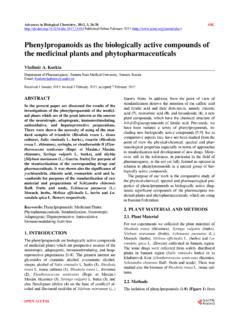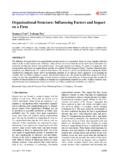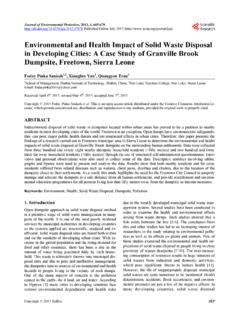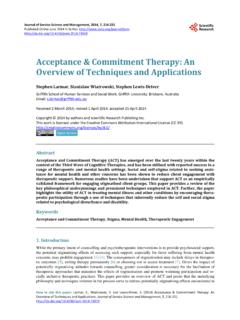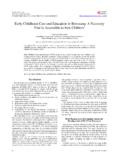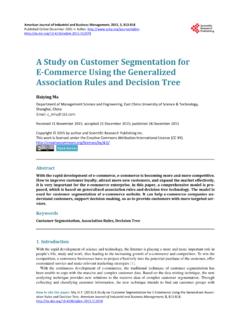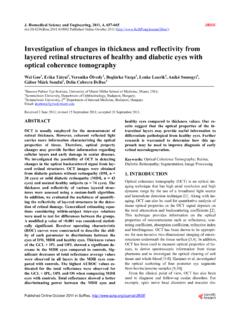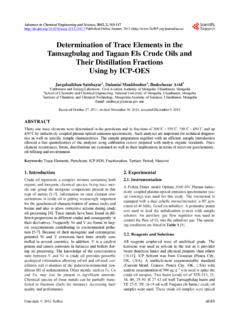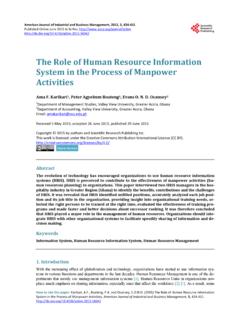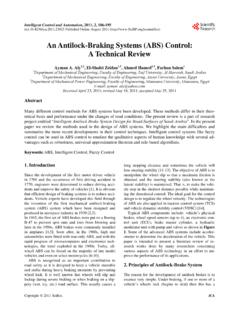Transcription of Validation of the 8-Item Morisky Medication Adherence ...
1 Open Journal of Nursing, 2016, 6, 158-169. Published Online March 2016 in SciRes. Validation of the 8-Item Morisky Medication Adherence Scale in Chronically Ill Ambulatory patients in Rural Greece Sotirios Plakas1,2, Dimos Mastrogiannis3, Marianna Mantzorou1, Theodoula Adamakidou1,2, Georgia Fouka1,2, Angeliki Bouziou4, Chrysoula Tsiou1, Donald E. Morisky5. 1. Department of Nursing, Technological Educational Institution (TEI) of Athens, Athens, Greece 2. Research Unit for Nursing Rehabilitation of the Chronically Ill, Technological Educational Institution (TEI) of Athens, Athens, Greece 3.
2 Department of Nursing, Technological Educational Institute of Central Greece, Lamia, Greece 4. General Hospital of Aitoloakarnania, Agrinion, Greece 5. Department of Community Health Sciences, UCLA Fielding School of Public Health, Los Angeles, CA, USA. Received 6 February 2016; accepted 8 March 2016; published 11 March 2016. Copyright 2016 by authors and Scientific Research Publishing Inc. This work is licensed under the Creative Commons Attribution International License (CC BY). Abstract Objective: To validate a Greek version of the structured self-reported 8-Item Morisky Medication Adherence Scale (MMAS-8) and determine its psychometric properties in patients with chronic illnesses.
3 Methods: A cross-sectional survey was conducted in a small public hospital and a public health care centre, in a rural town in western Greece. The sample consisted of 100 patients with various chronic illnesses. Data were collected between January-May 2011, on the Greek version of the MMAS-8 and Beliefs about Medicines Questionnaire (BMQ). Results: Scale's reliability analysis revealed an overall Cronbach's alpha of and the corrected item to total correlations, were greater than for each of the 8 items comprising the Medication Adherence scale, showing good internal consistency.
4 Convergent validity was supported by a significant correlation between the present scale's total score and the BMQ-Specific Necessity score (Spearman's rho = , p <. ). Conclusion: The current study showed acceptable reliability and validity of the Greek ver- sion of the 8-Item MMAS to measure Adherence to medications for various chronic illnesses. The validated Greek version of the MMAS-8 can help towards understanding Adherence barriers in Greece so as to develop effective strategies to increase Adherence and reduce the costs. Keywords Adherence , Validation , Chronic Illnesses, Morisky MMAS-8 Scale How to cite this paper: Plakas, S.
5 , Mastrogiannis, D., Mantzorou, M., Adamakidou, T., Fouka, G., Bouziou, A., Tsiou, C. and Morisky , (2016) Validation of the 8-Item Morisky Medication Adherence Scale in Chronically Ill Ambulatory patients in Rural Greece. Open Journal of Nursing, 6, 158-169. S. Plakas et al. 1. Introduction One of the most important issues in the medical treatment of chronic illnesses is patient Adherence to medica- tions. Adherence is the degree to which a person's behaviour coincides with medical advice [1]. Adherence to prescribed medicines is a way to improve one's health, assuming the prescription is appropriate and correct.
6 A growing body of literature on patient Adherence has shown that a large proportion of patients are non-ad- herent ranging from as low as to as high as 87% [2]-[6]. In a recent report of the ABC (Ascertaining Barriers for Compliance) project in Europe, in a sample of 2630. hypertensive patients from 11 EU countries, which used the 4-item Morisky scale for primary outcome measure and the RS scale for secondary outcome measure, 42% were found to be non-adherent to their Medication regime while for 18% of them that was intentional [7]. It was also found that Adherence rates varied considera- bly among countries, as 34% of hypertensive patients were non-adherent in Austria and 70% were non-adherent in Hungary [8].
7 In another study in Northern Ireland using the Reported Adherence to Medications scale (RAM), only of hypertensive patients were found to be non adherent [9]. In Greece, different studies with different methodologies to estimate Adherence among hypertensive patients have shown conflicting results. A study using the 4-item MMAS has reported that 74% of hypertensive patients were adherent to their medications [10]. In another study [11] most of the participants ( ) reported they re- ceived their Medication according to their physician's directions while statistically significant correlations were found between the mean systolic blood pressure values and compliance with drug treatment (rpb = , p <.)
8 On the other hand, other researchers [12] measuring Adherence based on a number of questions about regular use of medications, reported that only 15% of hypertensive patients were adherent. This discrepancy in research evidence regarding Medication Adherence in Greece, needs further exploration because poor Adherence has not only been related with poorer patient outcomes, illness complications, and higher morbidity [5] [12] but poor Adherence can also cause direct and indirect increases in costs to the health care systems [14]. Greece is currently experiencing severe fiscal problems and severe austerity measures are in effect, with the aim to reduce the public dept by reducing health expenditure among other measures [15].
9 In 2008, per capita spending for pharmaceutical products in Greece was the highest among European countries in 2008 amounting to 700 US dollars per person [15]. Thus, reducing expenses for pharmaceutical products is a major target for the Greek government. According to Karamanoli [16], medical expenses were billion euros in 2009 and were dropped to billion euros in 2011 following the measures taken. However, as Vandoros and Stargardt [15]. point out, those measures should not undermine quality of care for the Greek patients ; instead there is a need to increase efficiency in medicines' use.
10 A valid estimation of the problem of Adherence in Greece is imperative for the development of effective strategies to improve Adherence to medications as Adherence is one way to improve efficiency of the medicines used. Also, understanding Adherence barriers is necessary to determine strategies to improve Medication Adherence and achieve optimum outcomes. Several factors have been linked with low compliance to prescribed medicines, with the main ones being the patient himself, the condition of the illness, the management of the disease, the socioeconomic status of the pa- tient and health care system/health professionals factors [6].
